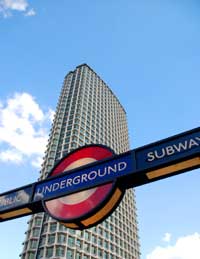British drivers have to contend with the most overcrowded roads in Europe. London commuters pay €8 for a one-way ride in central London and are suffering frequent delays. British trains are, despite privatisation, slow, expensive and crowded. London Heathrow, Europe’s biggest airport, has deteriorated so far that Ken Livingstone, London’s Mayor, accused it of casting ‘shame’ on London.
Business travellers have a new term for their trips into and out of London: Heathrow hassle. Delays, overcrowding and tortuous security screening procedures at Heathrow are deterring corporate travellers and are threatening to undermine London’s growing status as leading financial centre. Senior business executives told that international executives already were seeking to bypass London and avoid meetings there. They expect that there are lots of people who will fly through Frankfurt, Paris or Amsterdam. ‘Heathrow is unspeakable bad in international airport terms’, a high-ranked American business man said. He came from Berlin, missed his connecting flight to Los Angeles because of air traffic congestion in London, was rebooked later that day to Cologne, but unfortunately his bag stayed on Heathrow for another two days. In the meantime he was confronted at Heathrow with ‘expensive and disappointing food in dirty, dingy and ugly hallways..’
This business man is not the only one complaining. London’s Mayor, Ken Livingstone, told the media that Heathrow is casting ‘shame’ on London with its ‘appalling’ conditions. ‘It’s quite clear the current management and the managements before them thought they could keep people almost as prisoner in Heathrow’s ghastly shopping mall so they can extract vast sums of money from them while they wait in appalling conditions’. A challenge for the fresh Gordon Brown government: Kitty Usher, the newly installed minister for Banking and Finance Matters said “I don’t want Dubai or New York executives saying, let’s not go through Heathrow”.
But the Britons are not only in a bad mood about Heathrow. Other branches of the country’s transportation system are also critisised. Executives of all corners of the island are complaining of missed meetings. They are pressing for better east-west road links, upgrading of congested northern motorways, more runways and better access to regional airports. And, last but not least, a far more reliable and increased railway capacity, not by splashy new investments but through pragmatic improvements to existing networks, through longer trains rather than a new north-south line.
Analysts cite a number of reasons why British transport is so hard to fix. The country is the most crowded of Europe’s large countries. With space already limited, strict planning laws have compounded the difficulty of building roads, railways and runways. But successive governments have made matters worse, experts are saying, “In their desire to curb new government outlay they became obsessed with private sector solutions.” The by the Thatcher governments privatised railways have shown many serious accidents with a heavy toll of human life. Another example: BAA, the operator of Heathrow airport, was bought by a commercial consortium led by Ferrovial, a Spanish construction company. According to London’s Mayor Livingstone ‘the airport authority is putting the commercial desire to maximise in-terminal shopping ahead of passengers comfort’.
The state of British infrastructure is a real constraint on economic growth. May be the often by British media critisised French policies can offer a solution. France cites its national infrastructure, ranging from comfortable high speed trains to a nationwide network of sleek motorways as one of the attractions for foreign investors.






